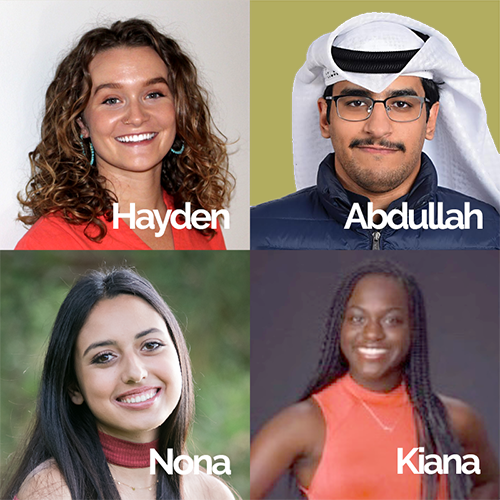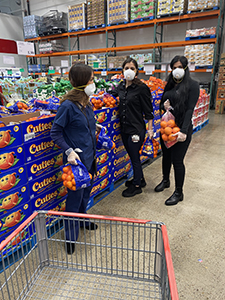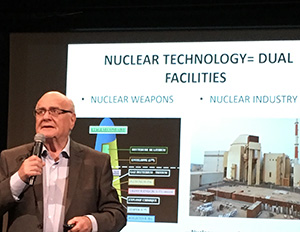
Features
Recent Feature
Past Features
"Borders, Migration and Detention in the Americas" Course
By Riley Martinez
The Daily Aztec
April 28, 2021
Interdisciplinary Human Rights Certificate Program Inspires Forward Thinking Students
Four students share their insights
 By Leslie L.J. Reilly
By Leslie L.J. Reilly
Hayden Pearce
Senior | Political Science major | Women’s Studies and Leadership minors
As her last semester approaches, Hayden Pearce has much to think about and many opportunities to pursue. One area in which she has a steadfast commitment, though, is human rights. Her first foray into the subject was in professor Grace Cheng’s Human Rights in a Global Perspective (POL-S 380) course. Pearce became passionate about human rights when she noticed a common theme running through many of her political science and women’s studies courses.
When Cheng introduced the Certificate in Human Rights program in spring 2020, Pearce knew it was the right program for her — it would allow her to learn as much as she could about the subject. Some of the courses she was already enrolled in were certificate electives, so it was an easy decision to add a few more courses to earn the certificate, which requires a total of 15 units.
Pearce enrolled in Women’s Roles in Conflict and Gender War and Peace (WS 570) and asked Cheng to add it to the certificate program since the subject is precisely aligned with human rights.
Cheng said, “This course adds yet another dimension to the already powerful curriculum of the certificate program. Topics that address historical and contemporary human rights issues provide students with a valuable range of interdisciplinary perspectives.”
Another course that Pearce felt fully engaged in was Food Justice (GEOG 440/POL-S 440) with lecturer James Murren. The course explores theoretical perspectives of institutions, markets, law, ethics, social mobilization, politics, and ecology along with subjects covering political strategies involved in food justice organizations, and movements aimed at creating fair, healthy, sustainable food systems locally and globally.
In one of Cheng’s courses, the discussion of a controversial topic and the surrounding cultural sensitivity about it, “really piqued my interest in human rights work and made me realize that I have a lot to learn — and I need to learn more,” Pearce said.
After graduation, Pearce is contemplating law school or fighting for human rights
in organizations that work with political leaders.
Abdullah Al Anjari
Senior | Political Science major | History minor
As a child growing up in Kuwait, Abdullah Al Anjari watched his father, the chairman of a humanitarian organization, provide aid to people heavily impacted by war. “I have always been interested in human rights and humanitarianism.” Al Anjari said.
Al Anjari enrolled in the certificate program with the aspiration of working for a human rights organization in the future. “This certificate will be a valuable addition to my bachelor’s degree,” he said.
One course that Al Anjari thoroughly enjoyed was the History of Human Rights. Fascinating subjects like human rights in the colonial era, human rights in U.S. foreign policy, and other thought-provoking topics were introduced. “I was inspired by all topics covered throughout the class,” Al Anjari said.
Al Anjari said, “I recommend this certificate to others for several reasons. Firstly,
it would be a valuable addition to any student’s bachelor's degree. Plus, it is open
for students from all majors, not only to students of political science. Lastly, the
subjects I have studied for the certificate so far are fascinating and compelling!”
Nona Saber
Senior | Political Science and ISCOR double major
Nona Saber has had a passion for human rights throughout her years studying at SDSU. “I knew that this certificate could elevate me in my future endeavors and open up more opportunities to me within the realm of human rights,” Saber said.
Upon completion of her internship with the International Rescue Committee (IRC) in El Cajon, she realized she was passionate about issues surrounding refugees and asylum seekers. She began taking courses that reflect immigration and citizenship policies.
“After taking Immigration and Border Politics, I have a better understanding of the issues faced by immigrant populations,” Saber said. “Another topic I have enjoyed learning about is global resistance.”
Saber recommends the certificate program to anyone interested in learning about global issues affecting different social groups. She said, “This certificate program allows you to explore multiple disciplines, so even if human rights is not related to your major, you can still enjoy learning about different subjects in history, geography, African American studies, LGBTQ+ studies, or another subject that interests you.”
She added, “By taking the courses required for the program, you will broaden your
knowledge of human rights issues, which affect people all around the world. No matter
what your career goals are, it will be beneficial to have an understanding of current
or past events affecting humans. It is also important to have a basic understanding
of the policies outlined in international treaties like the Universal Declaration
of Human Rights.”
Kiana Hunter
Senior | Political Science major
Kiana Hunter is planning to enter law school after graduation. “I found it necessary to take human rights classes to not only have the knowledge of laws and how a democracy works, but to also gain more insight on how these laws affect people,” she said. Understanding the issues will help inform her as she plans to help those suffering from diminishing human rights in her future career.
Hunter said, “I am passionate about making a change for those less fortunate and my goal with this certificate is to gain background knowledge on the problems with human rights in various countries — to ensure that I am able to help in the most efficient way possible.”
“Learning about human rights is an important step to becoming a great law student,” Hunter said. She hopes that using her position on both sides of the law will ensure that citizens worldwide are getting what they need.
Hunter believes that the courses in the human rights certificate program have helped her with understanding global cultures and issues. The topics presented in the required course Human Rights in a Global Perspective (POL-S 380) have helped shape her vision and inspired her to teach others that “not every culture has the same ideology and that it is not okay for a culture to force its beliefs on another.”
“This course of study has helped me become a more understanding person to others' beliefs and to see each side of a right rather than just seeing a western view that we have always been taught is the only way,” Hunter added.
To learn more, visit: Certificate in Human Rights.
Call For Volunteers: Help Seniors and Other Vulnerable Members of the Community
April 1, 2020
 My name is Milano Sliwa, and I am proud to say that I am a student at San Diego State
University studying Political Science. My sister, Monica Sliwa (a second-year Doctor
of Pharmacy student at UC Skaggs School of Pharmacy and Pharmaceutical Sciences),
and I wanted to help the vulnerable members of our community during this difficult
time.
My name is Milano Sliwa, and I am proud to say that I am a student at San Diego State
University studying Political Science. My sister, Monica Sliwa (a second-year Doctor
of Pharmacy student at UC Skaggs School of Pharmacy and Pharmaceutical Sciences),
and I wanted to help the vulnerable members of our community during this difficult
time.
Monica and I decided to start a community service outreach, with the help of Afrooz Sabouri, Monica's classmate. Our outreach aims to provide free grocery shopping and delivery services to individuals (especially those 60+yrs) who are at high risk of contracting COVID-19 virus in the San Diego area.
With the help of UC San Diego Health, Sharp Grossmont Hospital, Sharp Healthcare, Senior Resource Center, Alzheimer’s San Diego, San Ysidro Health, and St. Paul’s PASE we have reached more than 30 people who are eligible and awaiting service.
To ensure the safety of the volunteer and our patient, we closely follow required guidelines. For instance, we are required to use masks and gloves (which are provided to volunteers) while shopping and delivering. We wash/sanitize our hands frequently and avoid touching our face at all times. We also practice social distancing and keep a 6 feet distance between anyone we interact with. For more information regarding our guidelines, please email us at [email protected].
 Our mission is to help those in the community who are struggling with obtaining groceries
and other essentials, particularly those who speak languages other than English. Our
volunteers speak Arabic, Assyrian and Chaldean Neo-Aramaic, Spanish, Farsi, and French,
in addition to English.
Our mission is to help those in the community who are struggling with obtaining groceries
and other essentials, particularly those who speak languages other than English. Our
volunteers speak Arabic, Assyrian and Chaldean Neo-Aramaic, Spanish, Farsi, and French,
in addition to English.
To volunteer, please fill out our form.
Read more
For more about this project, see articles on the NBC San Diego (March 26, 2020), the SDSU NewsCenter (April 2, 2020), and Noticias (March 24, 2020).
Academic freedom, attacks on higher education among topics discussed at ‘Scholars at Risk’ event
By Catlan Nguyen
The Daily Aztec
March 2, 2020
Campus panel explores crossroads between human rights, migration
By Johann Derek Oribello
The Daily Aztec
November 2, 2019
El Paso Human Rights Statement
August 7, 2019
Students Participate in a Binational Research Class in Tijuana
By Sofia Bert
PSFA Stories
March 19, 2019
Profesora de Estudios Chicana y Chicano habla sobre la crisis de Nicaragua en SDSU
By Antonio Márquez
The Daily Aztec
February 27, 2019
Border Angels event tackles big issues surrounding migrant caravan
By Bella Ross
The Daily Aztec
December 11, 2018
Two-time Nobel Peace Prize IPPNW’s Dr. Abraham Behar on Nuclear Threats, Human Rights, and Democracy Today
By Grace Cheng, IHRI Director
November 2, 2018
 During a symposium on nuclear technology and policy in France last month, I had the
opportunity to speak with Dr. Abraham Behar, Past Co-President of the International
Physicians for the Prevention of Nuclear War (IPPNW), an organization that was awarded
the Nobel Peace Prize in 1985 and 2017. I asked Dr. Behar, who lives in France, about
the organization and the link between its work on human rights.
During a symposium on nuclear technology and policy in France last month, I had the
opportunity to speak with Dr. Abraham Behar, Past Co-President of the International
Physicians for the Prevention of Nuclear War (IPPNW), an organization that was awarded
the Nobel Peace Prize in 1985 and 2017. I asked Dr. Behar, who lives in France, about
the organization and the link between its work on human rights.
GC: What is the IPPNW and how did it come into being?
Dr. Behar: International Physicians for the Prevention of Nuclear War (IPPNW) is a non-partisan federation of national medical organizations in 62 countries, representing tens of thousands of doctors, medical students, other health workers, and concerned citizens who share the common goal of creating a more peaceful and secure world freed from the threat of nuclear annihilation.
IPPNW was founded in 1980 by physicians from the United States and the former Soviet Union who shared a common commitment to the prevention of nuclear war between their two countries. Citing the first principle of the medical profession — that doctors have an obligation to prevent what they cannot treat — a global federation of physician experts came together to explain the medical and scientific facts about nuclear war to policy makers and to the public, and to advocate for the elimination of nuclear weapons from the world’s arsenals.
GC: IPPNW received the Nobel Peace Prize in 1985 for its work to provide substantive information and awareness about the catastrophic consequences of nuclear war. It seemed hopeful then, with the Cold War winding down, that the world would see an end to the nuclear arms race.
Dr. Behar: Although the Cold War ended with the collapse of the Soviet Union in 1991, the US and Russia retained thousands of nuclear weapons ready to launch at a moment’s notice. Proliferation and the threat of nuclear terrorism have added to the nuclear danger in the post-Cold-War world. In recent years we have learned that even a limited, regional nuclear war using a fraction of the world’s nuclear weapons would cause irremediable harm to the Earth’s ecosystems and could result in the starvation of as many as two billion people in a “nuclear famine.”
GC: Some have pointed out, however, that most wars are not fought with nuclear weapons.
Dr. Behar: We recognize that the catastrophic health and environmental consequences of a nuclear war are at the extreme end of a continuum of armed violence that undermines health and security. IPPNW is committed to ending war and to addressing the causes of armed conflict from a public health perspective.
The 1990s global campaign to ban landmines marked IPPNW’s first major entry into the non-nuclear arena. The federation became engaged in addressing small arms violence in 2001 when we launched Aiming for Prevention, which has broadened to include all types of armed violence. Aiming for Prevention has been driven by IPPNW affiliates from the global South—primarily Sub-Saharan Africa, Latin America, and South Asia—who live and work in areas where armed violence is a constant threat and consumes significant portions of health care budgets.
In 2013, IPPNW participated in the successful campaign to adopt the Arms Trade Treaty. As part of Aiming for Prevention, IPPNW is also an active participant in the World Health Organization’s Violence Prevention Alliance.
GC: The IPPNW’s work was recognized with a Nobel Peace Prize again last year.
Dr. Behar: ICAN — the International Campaign to Abolish Nuclear Weapons — was launched/co-founded by IPPNW in 2007 and received the Nobel Peace Prize in 2017 for its role in achieving a treaty to ban and delegitimize nuclear weapons, leading to the global elimination of these most destructive of all weapons. This was the Treaty on the Prohibition of Nuclear Weapons (TPNW). The treaty was adopted by the United Nations last year by a vote of 122-1-1, meaning that a majority of nations have demanded the total abolition of nuclear weapons.
GC: Last month (October 2018), the United States withdrew from the 1987 Treaty on Intermediate-Range Nuclear Forces (INF). What is IPPNW’s reaction to this?
Dr. Behar: IPPNW board chair, Dr. Bjorn Hilt of Norway has stated: “It is very disturbing that yet another hard-won achievement to restrain nuclear arms deployments—a treaty that marked the beginning of the end of the Cold War and for which IPPNW campaigned throughout the 1980s—may be tossed aside by President Trump at the same time that the US is officially leaving the Iran nuclear deal.”
The big loser in the new East-West confrontation could be Europe. Before the conclusion of the INF treaty 30 years ago, there was an uncontrolled arms race between the major powers. If nuclear war had broken out, either by intention or accident, it likely would have begun in Europe and would have obliterated the nations in its front lines. The signing of the historic INF Treaty in 1987 by President Reagan and Secretary Gorbachev relieved some of the immediate danger. Its impending demise threatens a relapse into a new Cold War, with Europe again at ground zero.
Dr. Alex Rosen, chairman of IPPNW Germany, has said: “Both the US and Russia own a share of the blame for this situation, with each accusing the other of breaking the treaty. The recent modernizations of the nuclear arsenals on both sides, especially the development of medium-range cruise missiles, but also the establishment of a missile defense system by the United States in Romania and Poland and the Russian deployment of short-range missiles in Kaliningrad clearly contradict the spirit of the INF agreement. It is time to settle these questions at the negotiating table.”
GC: Is there a possibility for returning to the negotiating table?
Dr. Behar: Both President Putin and President Trump expressed desire at different points in their careers to negotiate the total abolition of nuclear weapons. Citing this, IPPNW called upon the two leaders to begin a wider discussion of their nuclear arsenals, rather than ending an iconic nuclear weapons limitation treaty.
Referring to the support for the TPNW by the majority of UN member-states, IPPNW co-President Dr. Ira Helfand urged: “These nations and the people of the world are sending a clear signal to the nuclear weapons states to pay heed to their obligation to completely disarm under the 50-year old Nuclear Non-Proliferation Treaty (NPT). The ‘Back from the Brink’ Campaign in the US outlines steps that could be taken by Congress and the US President, if they wish to be true leaders in avoiding nuclear war. This should not be a partisan issue. As President Reagan famously said, ‘nuclear war cannot be won and must never be fought.’ At a time when we desperately need steps forward toward disarmament, withdrawing from the INF treaty would be major step backward.”
[Note: The US, Russia, China, the UK, and France all refuse to support the TPNW.]
GC: On the topic of nuclear energy, during its meeting last November the UN General Assembly spoke in strong support of promoting nuclear power as solution for “green growth.” Do you think that nuclear power can be harnessed for such peaceful purposes to promote sustainable development?
Dr. Behar: Nuclear power is not a good investment and the true and long-term costs and effects of nuclear power far outweigh its potential short-term benefits. IPPNW in Europe has identified the detrimental effects of uranium mining and nuclear waste on the environment an on public health and listed the most relevant studies on the effects of uranium mining and civil nuclear energy on childhood leukaemia, lung cancer and other radiation-related diseases. We explained the underestimated risks of nuclear catastrophes and talked about the nuclear legacy that we are leaving to future generations. We also cited studies showing that nuclear energy is in fact irrelevant when it comes to the reduction of greenhouse gas emissions or alleviating climate change.
The inextricable links between nuclear power and nuclear weapons, brought to light in the common interests between the civil nuclear industry and the British Trident nuclear submarine program recently was also discussed, as were the attempts of the nuclear lobby to create fake citizen groups and NGO's in order to green wash its business model.
We presented an outlook to what could be described as a real energy revolution: modern energy conservation and efficiency methods, combined with 100% renewable energy generation, feeding flexible, distributed, community-based smart grid systems that would offer energy autonomy and independence of fossil and nuclear fuel imports.
Human rights and democracy are linked: Both are in the opposite of nuclear industry management; because security and safety in this production must have secret, hard organisation and unit command. Therefore, in the future, in accordance with democracy and human rights, we need a kind of energy under popular control.
GC: You mention human rights. What is its connection to the effort to eliminate the nuclear threat?
Dr. Behar: If prevention is the only way to eliminate nuclear threat, peace and human rights must be major’s goals. It is necessary to learn about non-violent management for any conflicts, to understand step-by-step democratic change for our behaviour. Finally, the first, the best human right is SURVIVAL. In this issue, the first condition is to build a nuclear free world. Please, make our planet great again.
